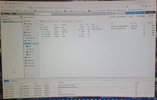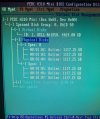Hello,
I'm semi-retired and Very new to Proxmox, been managing/running about 15 VMs on 2-3 VMWare host servers at two locations in a company since about 2014 with no problems. We're trying to repurpose an old Dell R720 to try Proxmox out. I installed Proxmox (twice), trying to get an array of 6 1.2 TB drives configured in RAID 50 into Proxmox, but I'm stuck. I cannot find any documentation that helps yet.
First install of Proxmox, I did not have these 6 drives, only the 500GB SSD that Proxmox is installed on. That went fine and I was able to install a couple VMs on that no problem, they ran fine for a couple weeks while I waited for the 1.2TB drives. Could not add any storage for the 1.2TB though, and it showed as GPT No, even after I initialized it for GPT, so I decided to start over.
On the second install of Proxmox, the 4.6TB storage showed up as SDA. Tried to create an LVM and it seemed to start out OK, but then failed, and then the storage is no longer even showing.
Is there documentation or anything I can read with steps to add a storage array to Proxmox?
I'd love to know what step(s) I'm missing. I'm not very well-versed in linux, but can kind of get around in it.
Thanks.
I'm semi-retired and Very new to Proxmox, been managing/running about 15 VMs on 2-3 VMWare host servers at two locations in a company since about 2014 with no problems. We're trying to repurpose an old Dell R720 to try Proxmox out. I installed Proxmox (twice), trying to get an array of 6 1.2 TB drives configured in RAID 50 into Proxmox, but I'm stuck. I cannot find any documentation that helps yet.
First install of Proxmox, I did not have these 6 drives, only the 500GB SSD that Proxmox is installed on. That went fine and I was able to install a couple VMs on that no problem, they ran fine for a couple weeks while I waited for the 1.2TB drives. Could not add any storage for the 1.2TB though, and it showed as GPT No, even after I initialized it for GPT, so I decided to start over.
On the second install of Proxmox, the 4.6TB storage showed up as SDA. Tried to create an LVM and it seemed to start out OK, but then failed, and then the storage is no longer even showing.
Is there documentation or anything I can read with steps to add a storage array to Proxmox?
I'd love to know what step(s) I'm missing. I'm not very well-versed in linux, but can kind of get around in it.
Thanks.




